Review for From Up On Poppy Hill - Double Play: The Studio Ghibli Collection
Introduction
I can’t think of a more auspicious time to release From Up On Poppy Hill in the UK. Just recently, master director Hayao Miyazaki announced his retirement from directing feature films, and quite understandably, thoughts turn to just who might take up his mantle for the future of Ghibli. From Up On Poppy Hill might just provide an answer. Also, quite recently, Tokyo was awarded the right to hold the 2020 Olympics, although given the 2011 earthquake and the legacy of Fukushima, it’s fair to say that some in Japan, and some outside have conflicted feelings about this. From Up On Poppy Hill is set in 1963, a year before Tokyo last held the Olympic Games, and once more there was a degree of ambivalence, given the passage of less than 20 years following the Second World War. From Up On Poppy Hill could just ride a wave of serendipity into public consciousness. But it might just be a worthy film in its own right too.
From Up On Poppy Hill is an important film in the Ghibli canon, as it marks the first time that someone other than Hayao Miyazaki and Isao Takahata has directed a second feature at the studio, that someone being Hayao’s son Goro Miyazaki, which might signify the future direction for the studio. I must admit to a little trepidation when I heard that Miyazaki junior would be helming another film, as his first feature, Tales of Earthsea was one of the few Ghibli films to attract critical disapproval. I found it to be a weak and unfocused story that failed to engage with the viewer, and a disappointing adaptation of a fantasy epic. However, for From Up On Poppy Hill, the genre switches away from fantasy, and instead offers a little nostalgic romance, with a smaller, character based story. I have to admit that I have a soft spot for such films from Ghibli, films like Whisper of the Heart and Only Yesterday, and my anticipation for the film by far outweighed my trepidation.
1963 in Yokohama, and the impending Tokyo Olympics has infused the nation with a spirit of forward thinking and renewal. For Konan Academy, that manifests in the school’s decision to tear down the vintage clubhouse and replace it with a modern building. That’s something that concerns the various after-school clubs and their members that use the building, and quite naturally, the students are motivated to protest the decision, both in the school newsletter and in more visible ways. It’s when the writer of the newsletter, Shun Kazama leaps from the clubhouse roof to make the point that he catches the eye of Umi Matsuzaki. But Umi has long since made an impression on Shun, as she raises signal flags in front of her house every morning, and Shun sees them on his way to school on his father’s tugboat. As they work together to save the clubhouse from demolition, they become close, but when Umi shows Shun her family photo album, Shun sees a photo that threatens to stop their romance before it can even begin.
From Up On Poppy Hill is released as a single disc DVD, Double Play Blu-ray and DVD, and Limited Collector’s Edition Double Play, but for the purposes of this review, I’m just looking at the Blu-ray check disc.
Picture
From Up On Poppy Hill gets a 1.85:1 widescreen transfer at 1080p resolution. With such a recent film, there are really no issues to speak of with the image. It’s clear and sharp throughout, line art is meticulously recreated, the detail in the animation is excellent, and brings out Ghibli’s usual lush character and world design. The clubhouse is a veritable Aladdin’s Cave of extracurricular activity, and you see all its wonder in the clarity of the transfer. The characters follow the usual design ethic from Ghibli, but are individual enough to bring out their personalities.
The images used in this review are sourced from the PR and aren’t necessarily representative of the retail release.
Sound
You have the choice of DTS-HD MA 5.0 English and Japanese, with optional translated subtitles and a signs only track. I watched the film through in Japanese and was very happy with the experience. The voices suit the characters well, the music soundtrack is eclectic, mellow and very evocative of the period, and there is a nice subtle ambience maintained by the surround audio. The subtitles are accurately timed and free of typographical error. If I did have a small nitpick, it’s that sometimes background dialogue wasn’t subtitled along with the main dialogue. I’m curious as to what the Philosophy Club President was proclaiming inside the clubhouse while Umi and her sister were outside.
This was the first Ghibli film in quite some time that didn’t get a distribution by Disney, instead falling to the US GKids distributor. It certainly doesn’t tell in the dub, which directed by Gary Rydstrom, attracts some of the Hollywood a-list, including Ron Howard, Beau Bridges, Jamie Lee Curtis, Gillian Anderson and Bruce Dern, as well as Anton Yelchin and Sarah Bolger in the lead roles. I sampled a couple of scenes, and found it to be a strong, witty and entertaining dub.
Extras
From Up On Poppy Hill looks to be a Madman Entertainment sourced master, at least according to the disc credits at the end of the film. The animated menu presents the disc’s contents, and of course a pop-up menu bar appears during the film if you press the appropriate button on the remote.
As usual with a Ghibli film, you can watch the whole thing with picture in picture storyboards, which here take up the bottom right hand corner of the screen.
The most substantial extra feature is the Press Conference – Theme Song Announcement, presented in 1080i, and lasting 39 minutes. The creators and the people behind the theme song gather to talk about the film and it quickly becomes clear that this is more than just the normal press junket. It was recorded two weeks after the 2011 earthquake and that emotional weight is apparent on the speakers.
The Interview with Goro Miyazaki lasts 18 minutes, and took place more recently. It’s a more light-hearted chat with the director about the film, as he reveals why the 1963 period was chosen, as opposed to the original manga’s 1980 setting, and he talks about how Yokohama in the film differs from the real city. (1080i)
There is Hayao Miyazaki’s Staff Speech, which lasts 6 minutes, and he rallies the troops after an early in-house screening of the film. (1080i)
The Music Video, “Summer of Farewells – From Up On Poppy Hill” Performed by Aoi Teshima lasts 6 minutes, is presented in 1080i, and does exactly what it says.
You get 7 minutes of original trailers and TV spots presented in 1080p.
Yokohama Featurette – Stories of Past and Present lasts 23 minutes, is in 1080i, and is for me a really useful addition to the disc. It compares past and present Yokohama with the use of vintage and recent footage, although it is captioned not narrated. It matches one of the underlying messages in the film, but it’s also a fascinating look at how the town has developed over the last 50 years and more, with a look at some of the key locations in the film.
The Making of Poppy Hill – Featurette With English Cast lasts 22 minutes and is in 1080p. You get to see the English cast at work, but the only interviews of note are with the ADR director Gary Rydstrom, and Screenwriter Karey Kirkpatrick; it’s light on input from the actors. It’s par for the course when it comes to these ADR featurettes, although it is blighted by hollow audio for the duration.
Finally there are Studio Ghibli trailers in 720p for Laputa: Castle in the Sky, Ponyo, Arrietty, My Neighbour Totoro, and Kiki’s Delivery Service.
While the image quality for the feature is to my eyes flawless, the same can’t be said of the extra features, with some of the featurettes afflicted with posterisation.
Conclusion
If there is one thing to take-away from this film, From Up On Poppy Hill, it’s that everyone deserves a second chance. Goro Miyazaki may have failed to impress with Tales From Earthsea, but at the second time of asking, he delivers what will surely come to be regarded in future years as a Ghibli classic. It is truly up there with their slice of life romances like Only Yesterday and Whisper of the Heart, engaging character studies that evoke nostalgia and audience empathy with effortless ease. For me, From Up On Poppy Hill is the best Ghibli movie in years, certainly more rewarding and effective than any other feature since Spirited Away.
One thing that really appeals is that it is also the first time in several years that Ghibli have stepped back from the fantasy genre, in order to tell a story firmly grounded in the real world, although through the rose tinted goggles of nostalgia, and an almost hallowed reverence to the past. The film does almost present a fantasy version of the past, one that is rich in colour, cleaner, and generally warmer than today. This is the past as we want it to be, the way that we come to remember it, not the past as it actually was.
At its heart, From Up On Poppy Hill is a simple tale of first love, a budding high school romance, albeit one that is almost stymied by an unexpected complication. It’s the background to the characters, and the richness of the world they inhabit that make it appeal. By setting the film in 1963, just prior to the Tokyo Olympics, it catches the nation in a mood of renewal, coming out of the post-war reconstruction, but still burdened by the aftermath, yet looking forward to the future with optimism, and a spirit of innovation. Both of the film’s main characters have been touched by war, although in Umi’s case it’s the Korean War that has left her without a father. When she was a child waiting for her father to come home, she’d raise signal flags welcoming him home, and she has continued to do so ever since his loss. It’s seeing these flags that first enchant Shun.
Their relationship begins and develops over the matter of the school clubhouse. If you’ve seen any anime show set in a high school, you’ll be aware of the preponderance of extra-curricular activities for school-goers, with the go-home-club a distinct minority. It appears almost expected for students to enhance their personal development by devoting their free time to constructive pursuits outside of the syllabus, taking responsibility for their own development. From Up On Poppy Hill reveals that this is no new idea, but where things differ is in the nature of the activities that the students undertake. There is more of an academic bent to the club activities, and there is a visible enthusiasm for learning that is unique in this film’s exploration. Your average, contemporary set anime will offer Light Music Clubs, Athletics Clubs, Swimming Clubs and Cooking Clubs, but back in the sixties setting we see students undertaking activities in the Literature Club, the Archaeology Club, the Astronomy Club, and of course the Philosophy Club. What really stands out is indeed the enthusiasm that the students have for these activities. Another thing that stands out is that until the events of this film, it looks like a male only pursuit, although that may be down to the state of the club house at the start of the film.
When the announcement comes that the clubhouse is to be demolished in favour of a new building, it crystallises the central debate of the film, the conflict between past and future, and the tendency to discard what has come before for the new and shiny. It’s a message that is hardly new to Ghibli, as its films usually do treasure the past, and remind us of the elegance of certain aspects of history. With the advent of the 1964 Olympic Games, the nation wants to rush headlong towards the future, and by doing so discard the past. With the students fighting to preserve their clubhouse, and indeed doing so against the school board, they show a reverence and appreciation for history, as well as an independence of thought, no doubt inculcated by their club activities that the older generation appear to lack. The implication in the film of course is that it is just as important to hold onto the past to remember the mistakes that you made, as well as the successes.
From Up On Poppy Hill, despite Hayao Miyazaki’s Staff Speech, is for me Studio Ghibli doing what they do best, telling a simple, heartfelt and engaging story, but enriching it with period, setting, artwork and character. From Up On Poppy Hill will make you nostalgic for a time that most of us never lived through.
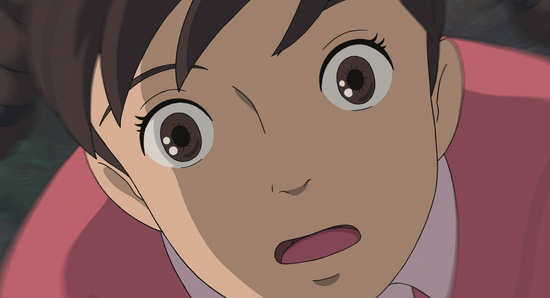
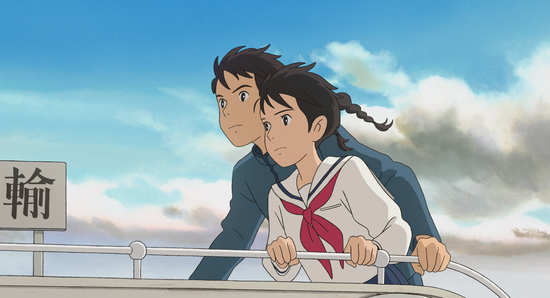
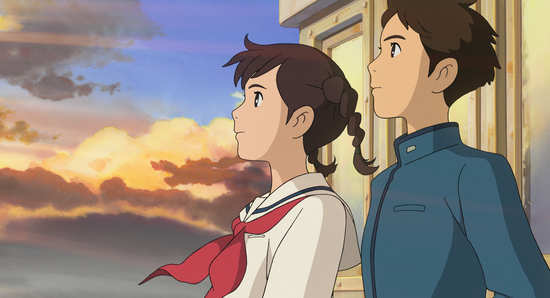
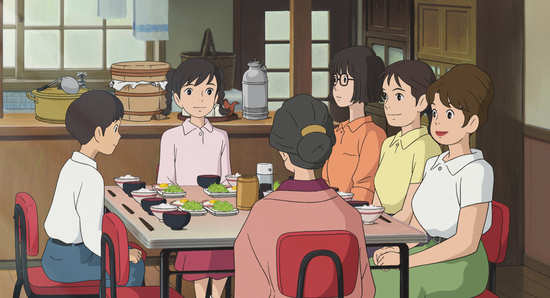
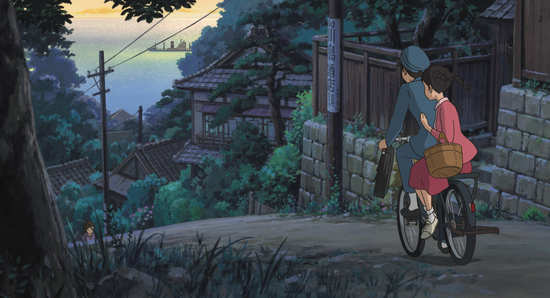
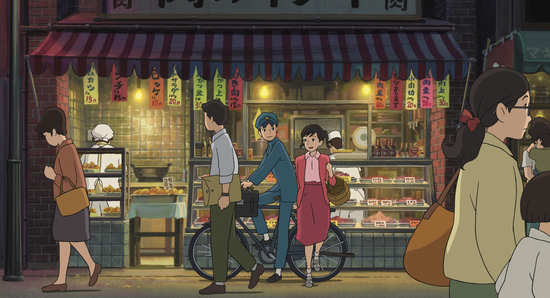
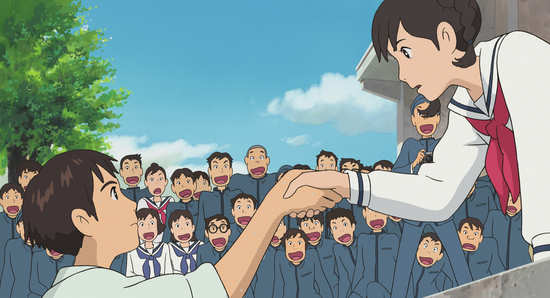
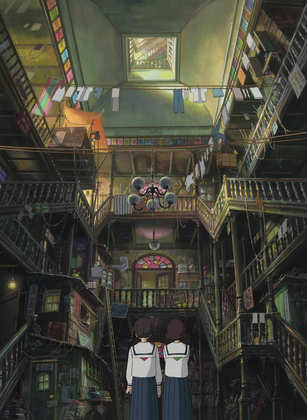
Your Opinions and Comments
Be the first to post a comment!